
The brain comprises billions of interconnected neurons that transmit and process information and allow it to act as a highly sophisticated information processing system. To make it as efficient as possible, the brain develops multiple modules tasked with different functions, like perception and body control. Within a single area, neurons form multiple clusters and function as modules—an important trait that has remained essentially unchanged throughout evolution.
Still, many unanswered questions remain regarding how the specific structure of the brain’s network, such as the modular structure, works together with the physical and chemical properties of neurons to process information.
Reservoir computing is a computational model inspired by the brain’s powers, where the reservoir comprises a large number of interconnected nodes that transform input signals into a more complex representation.
Now, a research team has developed machine learning based on reservoir computing to analyze the computational capabilities of an “artificially cultured brain” composed of neurons derived from the cerebral cortex of rats, i.e., rat cortical neurons.
The team’s findings were published in the Proceedings of the National Academy of Sciences on June 12, 2023, and was led by Takuma Sumi, Hideaki Yamamoto, and Ayumi Hirano-Iwata, researchers based at Tohoku University. They worked in collaboration with Yuichi Katori from the Future University Hakodate.
“Using optogenetics and fluorescent calcium imaging, we first recorded the multicellular responses of the cultured neuronal network,” said Yamamoto. “Then we decoded it using reservoir computing, finding that the artificial cultured brain possessed a short-term memory of several hundred milliseconds, which could be used to classify time-series data, such as spoken digits.”

Samples with a higher degree of modularity were found to exhibit better classification performance. Moreover, a model trained on one dataset was able to classify another dataset in the same category, revealing that the artificial cultured brain could filter information to improve the reservoir computing performance.
“The findings advance our mechanistic understanding of information processing within neuronal networks composed of biological neurons and move us toward the potential realization of physical reservoir computers based on biological neurons,” adds Yamamoto.
More information:
Takuma Sumi et al, Biological neurons act as generalization filters in reservoir computing, Proceedings of the National Academy of Sciences (2023). DOI: 10.1073/pnas.2217008120
Citation:
Artificially cultured brains improve processing of time series data, shows study (2023, June 29)
retrieved 29 June 2023
from https://techxplore.com/news/2023-06-artificially-cultured-brains-series.html
This document is subject to copyright. Apart from any fair dealing for the purpose of private study or research, no
part may be reproduced without the written permission. The content is provided for information purposes only.
Stay connected with us on social media platform for instant update click here to join our Twitter, & Facebook
We are now on Telegram. Click here to join our channel (@TechiUpdate) and stay updated with the latest Technology headlines.
For all the latest Technology News Click Here
For the latest news and updates, follow us on Google News.
